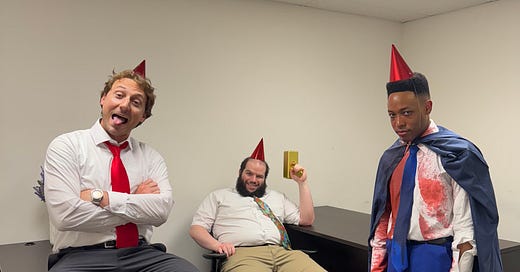5 Lessons From My Last Short Film Shoot
What went wrong, what saved the day, and what I’ll never do the same again.
Last Saturday, I shot my latest short film — Blood Money in just under 12 hours.
It was an incredible experience with a great cast & crew. We faced a lot of hurdles throughout the production but were able to overcome the issues and get everything we needed.
I’ve been deep into my rough cut this week and I’m extremely proud of the results. In this newsletter, I want to focus on some rapid fire lessons I learned over the course of the production.
1. Be selective with your cast and crew
This short film went well because we had an amazing cast & crew with great attitudes that were there to help bring the vision to life — collaborating without any ego involved.
The right people elevate the shoot, the wrong ones drain your time, energy, and momentum.
In my previous short films, I've had to deal with cinematographers refusing to get shots I wanted, egotistical producers trying to override creative decisions, and I’ve even had to cut an entire actor’s performance from a film — twice.
Make sure everyone who is coming to set is clear on the vision upfront, flexible, and willing to collaborate in a way that is productive, not combative.
2. Make the project a win-win for everyone
On low-budget films, you can’t always pay people what they’re worth — but you can create an environment where everyone walks away proud.
That means setting people up to do their best work, giving them something meaningful for their reel, and respecting their time.
When your cast and crew feel seen and supported, they give you everything they’ve got — and it shows on screen.
3. Low budget doesn’t have to mean unprofessional
Multiple cast members told me Blood Money was one of the most professional sets they’d ever been on — and we had almost no money. Why?
We fed people well, kept everyone clued in on everything, and kept communication open and respectful. When you create a safe, collaborative environment, your team shows up with everything they’ve got.
Budget doesn’t buy professionalism — culture does.
4. Be strict on vision but flexible on the details
Things will go wrong on set — shots get rushed, props break, locations fall through. But if you’re crystal clear on your film’s core themes and emotional tone, you can adapt without losing the soul of your story.
Stay committed to the feeling you want the audience to walk away with, even if you have to find unexpected ways to get there.
There was a scene that I had planned 8 shots for and we were behind schedule. We were able to condense it to 2 single setups & shot it in less than an hour.
The constraints rushed us at the time but it was actually the easiest scene to cut together in post and looks beautiful — achieving the same thing we would have with all 8 shots.
5. Nobody knows what they’re doing — make your film anyways
There were parts of Blood Money I had no clue how we’d pull off — scenes I stared at in the script thinking, How the hell are we gonna do this?
But we showed up, stayed flexible, and figured it out together. A huge portion of filmmaking is just getting in position, staying calm under pressure, and solving problems in real time.
You don’t need all the answers — you just need to start.
Shooting Blood Money was a great reminder of why I do what I do. Writing a script, building a team, and diving into the unknown together to create something amazing is what we as indie filmmakers live for.
Every film is a battle between your vision & reality.
The only way to get through it is to show up prepared, stay adaptable, and create an environment where people can do their best work.
If you’ve been sitting on an idea, waiting for permission or the “perfect” conditions — this is your sign to stop waiting.
Make the film — no one’s going to make it for you.
🎓 Skip the $100K Film Degree — Start Here Instead
I put together The Self-Taught Film School Box — a curated bundle designed to teach you how to actually learn from the films you watch & apply the lessons to your own projects.
Inside, you’ll get the same watchlist top film schools teach, a powerful analysis system, and a guide that shows you how to break down story, visuals, sound, and editing like a pro.
Whether you’re writing, directing, or just obsessed with movies — this is the toolkit I wish I had when I started.
📦 Instant access. One-time payment. Lifetime updates.
✅ 30-Day Money-Back Guarantee





My favorite part of this: “budget doesn’t buy professionalism culture does.” Amen!
number 3!